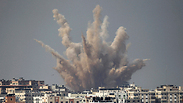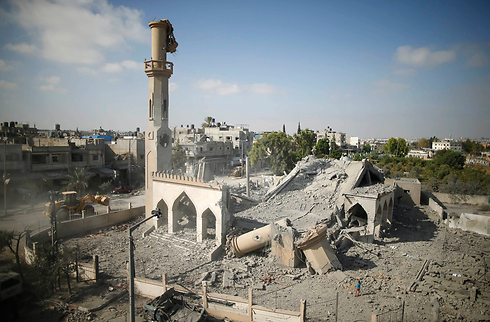
The road to a ceasefire is via Rafah
A drawn-out war of attrition would be worse for Israel than Hamas, which has learned well from Hezbollah how to win hearts and minds in wartime.
On the 49th day of fighting in Protective Edge, we have found ourselves in the middle of a war of attrition in which both sides are pulverizing one other with antagonistic fire. That is, the fighting is being conducted remotely, with no contact between IDF soldiers and Hamas fighters.
It is important to understand this point, as it explains why a war of attrition is ultimately worse for Israel than for Hamas. Even though Hamas is drawing fire and suffering serious damage, at rates far, far higher than Israel.
The reason for this absurd phenomenon is "absorption threshold" of Hamas, and the citizens of Gaza in particular, is far higher than what the citizens of Israel have to endure - at least this is how it is portrayed in the media. Hamas has to do almost nothing to prove to the Arab world and Palestinian street that it is holding on.
It is enough that Hamas keeps launching rockets and says it is winning to make the Arab world and Gazans believe that it has the upper hand. In Israel, on the other hand, we tell the truth and do not try to dress it up. Every Israeli citizen and world public opinion knows that residents of the South have left until the storm has passed, and that our media reflects the impatience and concern that the school year will not begin on time. Hamas takes advantage of this in the war for hearts and minds to prove that it is supposedly the victor.
This, by the way, is not a maneuver patented by Hamas. Hassan Nasrallah and his Hezbollah militant organization used the same method after the Second Lebanon War, even managing to win over the Arab world. The bluff was only exposed after eight years of Nasrallah and Hezbollah minding their manners on Israel's northern border.
Dispersing the fog
Given that this battle for hearts and minds is being waged alongside the physical war, it is very important to clarify a few issues. I did not have to think too much about this. It was enough to pick up on some of the most common questions asked by the Israeli public and answer them in order to almost completely disperse the fog of uncertainty that is typical of every war.
1. How long the fighting will last before we reach a stable ceasefire?
It is absolutely clear that all parties now want a ceasefire as soon as possible. The problem is that Hamas cannot agree to a ceasefire without any achievements to present to its people and to the citizens of Gaza - an achievement that would explain why it initiated this war in the first place. Similarly, the Israeli government cannot justify the fighting and casualties if it agrees to give Hamas this achievement and if it cannot prove that Hamas will be unable to rebuild after the fighting ends.
So far, the Egyptian mediators have been unable to bridge this gap. Even a Security Council resolution did not give Hamas what it wants. But it seems now that there will a different political solution: Egypt, it appears, is close to announce that it will open the Rafah border crossing for the entry and exit of people and goods from the Gaza Strip, a move that may provide to Hamas with the exit strategy and cause for a ceasefire that it was so looking desperately seeking. Things will become clear in the coming days and by the weekend we will probably know if we are looking at a stable ceasefire or wider war. Or maybe even a new ground incursion.
2. How, after its battering by the Air Force, can Hamas keep firing at the same rate and quantity?
Hamas has prepared very well, for at least five years, for the current conflict. He also initiated it. Accordingly, Hamas has armed itself with thousands of short-range rockets and mortars, as well as hundreds of medium-range rockets (160-70 km). This is why, after 49 days of fighting, it has no problem with supplies. If the organization is frugal with its attacks, it could keep firing for at least another month.
What is more important to know is that Hamas is prepared for a situation in which the organization has almost entirely fallen apart, but is still capable of firing. To manage this, it has produced thousands of buried launchers that are accessed underground. Each area and neighborhood in Gaza is under the control of a Hamas division, battalion or company. Each company and battalion army has what the IDF calls "launch activists" who have orders on when to fire and where, so you can cut off the head of the snake but the tail will keep moving – and in possession of rockets - until it is ordered to stop.
This, for example, is one of the reasons why every time there is a ceasefire, there is also some shooting after it comes into effect. These are not always rogue operatives launching rockets, but rather there is a broken connection, and they are simply following the directives they had previously been given.
3. Is it possible to defeat and destroy Hamas?
It is certainly possible, as we will see. But before asking how, one must decide whether it is necessary and if it will result in long-term quiet from the Gaza Strip. The answer is that it is certainly desirable and absolutely necessary to defeat Hamas, but it is doubtful whether it is desirable to topple it too.
The collapse of Hamas may well result in chaos in the Gaza Strip that would work to the future benefit of the Salafist and jihadist groups who are already in the area, namely in the Sinai. Those who think that Abbas can just take over the Gaza Strip in place of Hamas, is deluded - certainly in the short term. Thus, given the current situation, it is better for us to have a much-weakened Hamas, under strict oversight, than a replacement who would, from Israel's perspective, be far worse.
There are three ways to beat Hamas:
1. Disproportionate death and destruction that would force Hamas to stop fighting. Putin uses this pattern to subdue the Chechens and to compel the Chechen faction loyal to him. But to do so, he wrought complete physical destruction of the Chechen capital Grozny and the surrounding villages. I was there – and there is no stone left unturned. We cannot do that without the international community reacting furiously.
2. A relatively long war of attrition that would not result in disproportionate destruction but would cause certain processes developing in Gaza right now to ripen. Hamas would ultimately have to take notice of the feelings of the Gazans, but this may well take a long time. During that time Israel would suffer and on our side too there would be unexpected developments.
3. The full or partial reoccupation of the Gaza Strip in a broad and enduring ground operation that would force Hamas members to stop fighting and go into hiding. The problem is that such an action, even if conducted quickly and without too many casualties among the troops, would nonetheless require the army to leave a considerable force in the Strip, deploy the Shin Bet to the area and work slowly but surely to uproot Hamas from the ground up. This would take at least a year.
In addition, one must remember that Gaza City or even Khan Younis and Rafah are not refugee camps in the West Bank or even the old city of Nablus, they are massive urban sprawls and to seize control of them would take a long time and demand a high price in blood.
Hence, the defeat if not outright destruction of Hamas is possible, but under the current conditions, reaching a deal - and not destroying Hamas - is the preferred option. This is provided that the government then moves towards a diplomatic breakthrough that results in an interim settlement for the Israeli-Palestinian conflict, one which also includes reining in Hamas' military capabilities.
4. Do we need to keep providing Gaza with food, fuel and other goods during the fighting?
On the face of it, the fact that Israel has undertaken to prevent a humanitarian crisis in Gaza seems absurd. And it is absurd. But Israel it doing it in order to preserve the international legitimacy it enjoys for the air and sea blockade it has imposed on Gaza. Nonetheless, from the moment that Hamas initiated the current round of fighting and began firing daily at Israeli population centers, Israel's obligation to take care of the Gazans was over.
If the Egyptians are so concerned about their brothers in Gaza, they can open the Rafah crossing and allow unlimited assistance to pass through. We do not need to become slaves to Egyptian interests when we have a moral duty to use any leverage to end the fire from Gaza into Israel.











